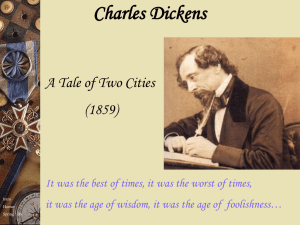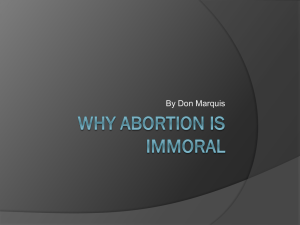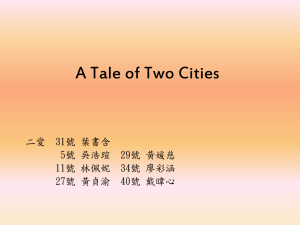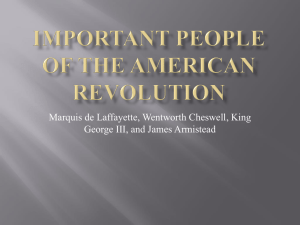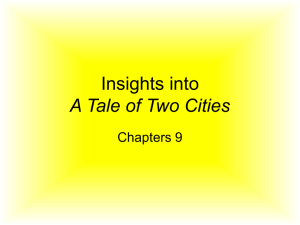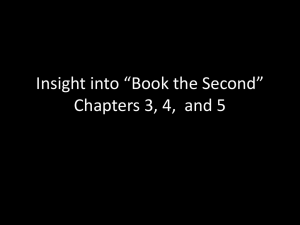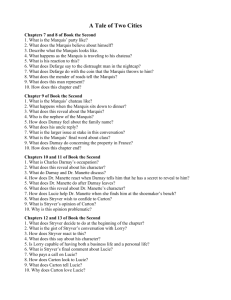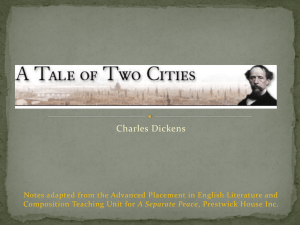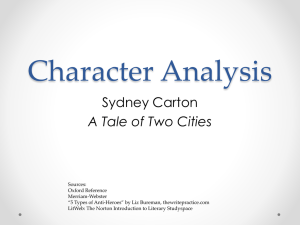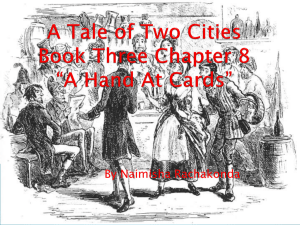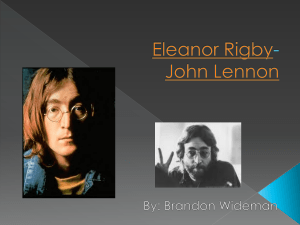A Tale of Two Cities by Charles Dickens (Character Project)
advertisement
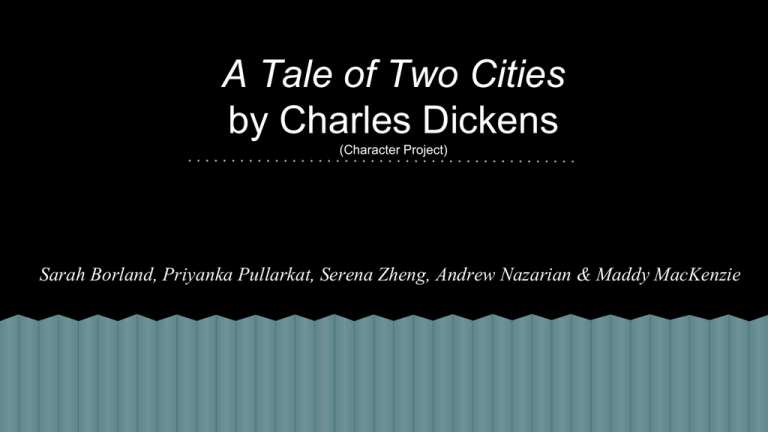
A Tale of Two Cities by Charles Dickens (Character Project) Sarah Borland, Priyanka Pullarkat, Serena Zheng, Andrew Nazarian & Maddy MacKenzie Marquis St. Evremonde Quote Book II Chapter VII “It is extraordinary to me, that you people cannot take care of yourselves and your children. One or the other of you is for ever in the way. How do I know what injury you have done my horses. See! Give him that (106)”. Book II Chapter VII “He threw out a gold coin for the valet to pick up , and all the heads craned forward that all the eyes might look down at it as it fell. The tall man called out against with a most unearthly cry, ‘Dead!’ (106)”. Dickens depicts Marquis as heartless, cold and inhumane, therefore, characterizing the aristocracy as those who only care about themselves. These quotes, highlight the dissent the poor classes feel towards the aristocratic classes and depict Marquis as a jerk, especially through the use of imagery and vivid tone words. Function The Monseigneur serves as a representation of everything that is wrong with the aristocracy. He is the only person in the village who can help to better the lives of the people, yet he lets them suffer. He does not even mourn the death of a child by his carriage. He is selfish, and flaunts his wealth even among the poorest people in the country. All of these qualities serve to show us that the aristocracy is no longer fulfilling its original purpose. His subsequent death serves as a warning to the aristocracy of England that similar fates await them. Metaphor/Symbol Marquis is naught but a bust. Like any sculpture, he is cold and heartless. As his carriage runs over a child, he merely tosses a coin to the child’s father in compensation without a sign of remorse. Also, a bust is symbolic of the rich as only the affluent can afford them, and Marquis is nothing if not wealthy. A bust represents his heartlessness, his cold demeanor, and aristocratic background. Allusion Marquis St. Evremonde is similar to another Dickens character from his earlier literature. The Monseigneur shows lots comparisons to Ebenezer Scrooge. They are both older men whose obsession with money consumes them and turns them into rude, lonely men. In the novel Marquis runs over a child and only throws a few dollars at him to “assist” the family. This scene is similar to Scrooge’s entire outlook on life in that no one below him deserves anything, even life. These are the things that Marquis and Scrooge have in common. Song Lyrics So Much Trouble in the World - Bob Marley “Bless my eyes this morning/Jah sun is on the rise once again/The way earthly things are going/Anything can happen” “You see men sailing on their ego trip/Blast off on their spaceship/Million miles from reality/No care for you, no care for me” “All you got to do: give a little...Now they sitting on a time bomb/Now I know the time has come/What goes on up is coming on down” These lyrics, if applied to the time period of the novel, would come from a lower class citizen aimed toward Marquis and the corrupt aristocracy. Those who are not upper class members of society are blessed every day they wake up. The sun that rises every day symbolizes the power and reign of the aristocracy that governs daily and is always present when the masses wake up. With the corrupt social institutions in place, life is unpredictable. Men like Marquis sail on their egos and travel far away from the harsh reality of the life of the masses. They can not relate to the majority of society so they do not care for them. However, the solution is to care and give effort in helping the impoverished. Marquis and his fellow aristocrats are ignorantly sitting on a time bomb that will explode into a revolution, and they will finally get what’s coming to them. https://www.youtube.com/watch?v=mgRm1ISlw_A Sydney Carton Quote Book II Chapter XIII “If it had been possible, Miss Manette, that you could have returned the love of the man you see before you--self-flung away, wasted, drunken, poor creature of misuse as you know him to be-he would have been conscious this day and hour, in spite of his happiness, that he would bring you to misery, bring you to sorrow and repentance, blight you, pull you down with him. I know very well that you can have no tenderness for me; I ask for none; I am even thankful that it cannot be (144)”. Dickens highlights the tough life Sydney lives, as one who is lonely, poor and unworthy of love. In this quote, Sydney is depicted as one who is undeserving and miserable. The tough love situation with Lucie also aids to Sydney’s dramatic and sad life. Through the use of long sentences and emphasis on words of sadness, Sydney Carton’s personality is illuminated. Function Sydney Carton is intelligent and attractive. He resembles Charles Darnay, and is the mastermind behind most of Mr. Stryver’s brilliant arguments. Yet he is a poor, lonely, drunkard. The juxtaposition between Darnay and Carton again shows Dickens’s use of duality, pairing completely opposite ideas. Because Carton is a poor orphan and Darnay a member of French aristocracy, their very different fates are sealed and out of their control. Carton receives the short end of the stick, and Dickens uses him to represent the wasted potential of a man oppressed by the bounds of a rigid and outdated class system. Metaphor/Symbol Sydney Carton is the sapling that stands in the shadow of the larger oak that is Charles Darnay. They are of the same species, and in equal circumstances, they would even look quite identical, but as the sapling has drawn the short straw and is forced into the grown oak’s shadow, it will die and decompose to form nutrient soil for new trees to grow. Allusion Within Sydney Carton I saw a lot of similarities to the character Eponine from Les Miserables. Eponine was a tragic hero who spent a majority of her time loving Marius with no love in return. She would do anything for his happiness which is how Sydney feels towards Lucie. Carton and Eponine were both of lower social classes, but neither by choice. They have great potential but it is sadly never fulfilled in their lifetimes and it is something that should be admired about them both. Song Lyrics Eleanor Rigby - The Beatles “Eleanor Rigby picks up the rice/In the church where a wedding has been/Lives in a dream/Waits at the window/Wearing the face that she keeps in a jar by the door/Who is it for?” “All the lonely people/Where do they all come from?/All the lonely people/Where do they all belong?” Carton is like Eleanor Rigby. He experiences loneliness as he waits for for the day when he will be with Lucie. Although he is charming and handsome, he is still quite lonely because of his social class. Similarly, The Beatles wrote this song to emphasize a depressing reality in a world of billions of people: some will always be lonely because its just the fate the world offers some people. https://www.youtube.com/watch?v=-LOgMWbDGPA
